PPMP20011 Portfolio: Commercial vs Political Stakeholder Interests
VerifiedAdded on 2021/04/17
|6
|1491
|64
Homework Assignment
AI Summary
This assignment is a student's portfolio, focusing on the management of stakeholder interests in project procurement. It analyzes the differences between commercial and political interests, exploring how project managers can navigate these conflicting priorities. The portfolio delves into various perspectives, including the four-quadrant model, organizational learning, identity processes, complex product-services, project life cycle, and forms of project procurement. It also examines negotiation strategies based on novelty, complexity, pace, and technology, and how these ideas can be applied in commercial negotiation. The student reflects on the relevance of different concepts and theories, including those from the provided readings, to develop a structured thought process around commercial project negotiation. The portfolio concludes by connecting the week's topic to previous weeks and assessing the applicability of the concepts from the readings, highlighting the importance of aligning negotiation strategies with the project's specific context and stakeholder dynamics.
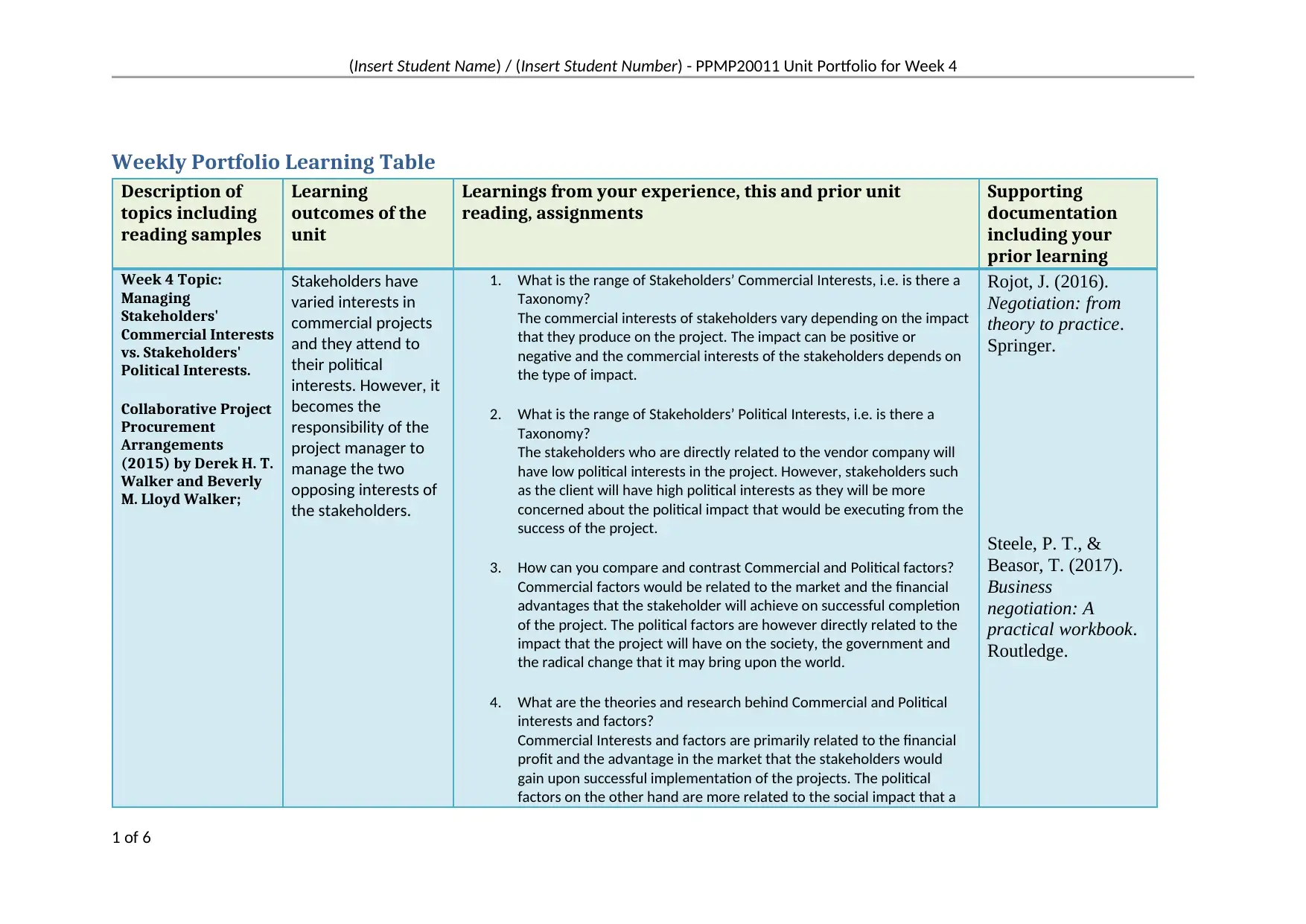
(Insert Student Name) / (Insert Student Number) - PPMP20011 Unit Portfolio for Week 4
Weekly Portfolio Learning Table
Description of
topics including
reading samples
Learning
outcomes of the
unit
Learnings from your experience, this and prior unit
reading, assignments
Supporting
documentation
including your
prior learning
Week 4 Topic:
Managing
Stakeholders'
Commercial Interests
vs. Stakeholders'
Political Interests.
Collaborative Project
Procurement
Arrangements
(2015) by Derek H. T.
Walker and Beverly
M. Lloyd Walker;
Stakeholders have
varied interests in
commercial projects
and they attend to
their political
interests. However, it
becomes the
responsibility of the
project manager to
manage the two
opposing interests of
the stakeholders.
1. What is the range of Stakeholders’ Commercial Interests, i.e. is there a
Taxonomy?
The commercial interests of stakeholders vary depending on the impact
that they produce on the project. The impact can be positive or
negative and the commercial interests of the stakeholders depends on
the type of impact.
2. What is the range of Stakeholders’ Political Interests, i.e. is there a
Taxonomy?
The stakeholders who are directly related to the vendor company will
have low political interests in the project. However, stakeholders such
as the client will have high political interests as they will be more
concerned about the political impact that would be executing from the
success of the project.
3. How can you compare and contrast Commercial and Political factors?
Commercial factors would be related to the market and the financial
advantages that the stakeholder will achieve on successful completion
of the project. The political factors are however directly related to the
impact that the project will have on the society, the government and
the radical change that it may bring upon the world.
4. What are the theories and research behind Commercial and Political
interests and factors?
Commercial Interests and factors are primarily related to the financial
profit and the advantage in the market that the stakeholders would
gain upon successful implementation of the projects. The political
factors on the other hand are more related to the social impact that a
Rojot, J. (2016).
Negotiation: from
theory to practice.
Springer.
Steele, P. T., &
Beasor, T. (2017).
Business
negotiation: A
practical workbook.
Routledge.
1 of 6
Weekly Portfolio Learning Table
Description of
topics including
reading samples
Learning
outcomes of the
unit
Learnings from your experience, this and prior unit
reading, assignments
Supporting
documentation
including your
prior learning
Week 4 Topic:
Managing
Stakeholders'
Commercial Interests
vs. Stakeholders'
Political Interests.
Collaborative Project
Procurement
Arrangements
(2015) by Derek H. T.
Walker and Beverly
M. Lloyd Walker;
Stakeholders have
varied interests in
commercial projects
and they attend to
their political
interests. However, it
becomes the
responsibility of the
project manager to
manage the two
opposing interests of
the stakeholders.
1. What is the range of Stakeholders’ Commercial Interests, i.e. is there a
Taxonomy?
The commercial interests of stakeholders vary depending on the impact
that they produce on the project. The impact can be positive or
negative and the commercial interests of the stakeholders depends on
the type of impact.
2. What is the range of Stakeholders’ Political Interests, i.e. is there a
Taxonomy?
The stakeholders who are directly related to the vendor company will
have low political interests in the project. However, stakeholders such
as the client will have high political interests as they will be more
concerned about the political impact that would be executing from the
success of the project.
3. How can you compare and contrast Commercial and Political factors?
Commercial factors would be related to the market and the financial
advantages that the stakeholder will achieve on successful completion
of the project. The political factors are however directly related to the
impact that the project will have on the society, the government and
the radical change that it may bring upon the world.
4. What are the theories and research behind Commercial and Political
interests and factors?
Commercial Interests and factors are primarily related to the financial
profit and the advantage in the market that the stakeholders would
gain upon successful implementation of the projects. The political
factors on the other hand are more related to the social impact that a
Rojot, J. (2016).
Negotiation: from
theory to practice.
Springer.
Steele, P. T., &
Beasor, T. (2017).
Business
negotiation: A
practical workbook.
Routledge.
1 of 6
Paraphrase This Document
Need a fresh take? Get an instant paraphrase of this document with our AI Paraphraser
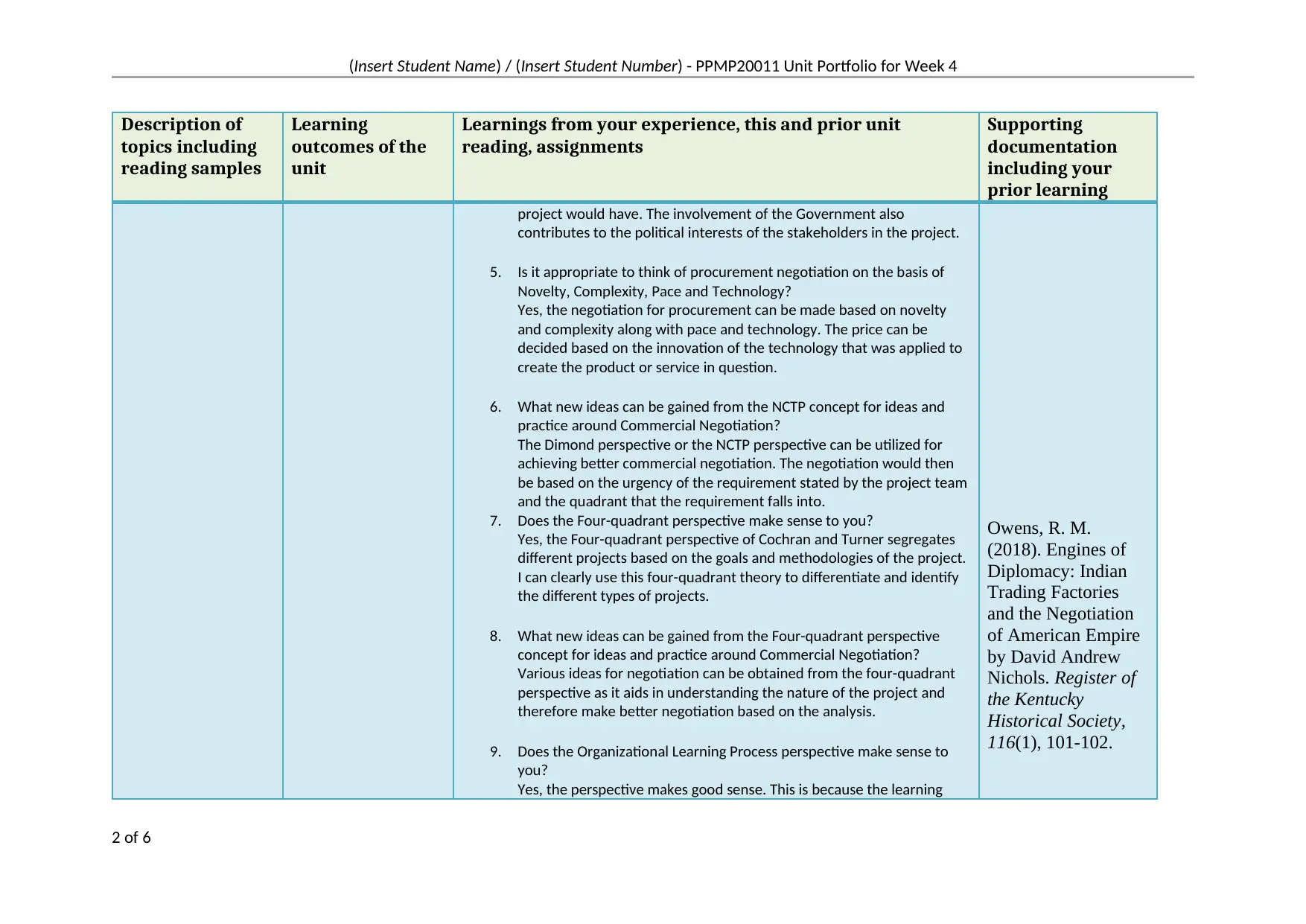
(Insert Student Name) / (Insert Student Number) - PPMP20011 Unit Portfolio for Week 4
Description of
topics including
reading samples
Learning
outcomes of the
unit
Learnings from your experience, this and prior unit
reading, assignments
Supporting
documentation
including your
prior learning
project would have. The involvement of the Government also
contributes to the political interests of the stakeholders in the project.
5. Is it appropriate to think of procurement negotiation on the basis of
Novelty, Complexity, Pace and Technology?
Yes, the negotiation for procurement can be made based on novelty
and complexity along with pace and technology. The price can be
decided based on the innovation of the technology that was applied to
create the product or service in question.
6. What new ideas can be gained from the NCTP concept for ideas and
practice around Commercial Negotiation?
The Dimond perspective or the NCTP perspective can be utilized for
achieving better commercial negotiation. The negotiation would then
be based on the urgency of the requirement stated by the project team
and the quadrant that the requirement falls into.
7. Does the Four-quadrant perspective make sense to you?
Yes, the Four-quadrant perspective of Cochran and Turner segregates
different projects based on the goals and methodologies of the project.
I can clearly use this four-quadrant theory to differentiate and identify
the different types of projects.
8. What new ideas can be gained from the Four-quadrant perspective
concept for ideas and practice around Commercial Negotiation?
Various ideas for negotiation can be obtained from the four-quadrant
perspective as it aids in understanding the nature of the project and
therefore make better negotiation based on the analysis.
9. Does the Organizational Learning Process perspective make sense to
you?
Yes, the perspective makes good sense. This is because the learning
Owens, R. M.
(2018). Engines of
Diplomacy: Indian
Trading Factories
and the Negotiation
of American Empire
by David Andrew
Nichols. Register of
the Kentucky
Historical Society,
116(1), 101-102.
2 of 6
Description of
topics including
reading samples
Learning
outcomes of the
unit
Learnings from your experience, this and prior unit
reading, assignments
Supporting
documentation
including your
prior learning
project would have. The involvement of the Government also
contributes to the political interests of the stakeholders in the project.
5. Is it appropriate to think of procurement negotiation on the basis of
Novelty, Complexity, Pace and Technology?
Yes, the negotiation for procurement can be made based on novelty
and complexity along with pace and technology. The price can be
decided based on the innovation of the technology that was applied to
create the product or service in question.
6. What new ideas can be gained from the NCTP concept for ideas and
practice around Commercial Negotiation?
The Dimond perspective or the NCTP perspective can be utilized for
achieving better commercial negotiation. The negotiation would then
be based on the urgency of the requirement stated by the project team
and the quadrant that the requirement falls into.
7. Does the Four-quadrant perspective make sense to you?
Yes, the Four-quadrant perspective of Cochran and Turner segregates
different projects based on the goals and methodologies of the project.
I can clearly use this four-quadrant theory to differentiate and identify
the different types of projects.
8. What new ideas can be gained from the Four-quadrant perspective
concept for ideas and practice around Commercial Negotiation?
Various ideas for negotiation can be obtained from the four-quadrant
perspective as it aids in understanding the nature of the project and
therefore make better negotiation based on the analysis.
9. Does the Organizational Learning Process perspective make sense to
you?
Yes, the perspective makes good sense. This is because the learning
Owens, R. M.
(2018). Engines of
Diplomacy: Indian
Trading Factories
and the Negotiation
of American Empire
by David Andrew
Nichols. Register of
the Kentucky
Historical Society,
116(1), 101-102.
2 of 6
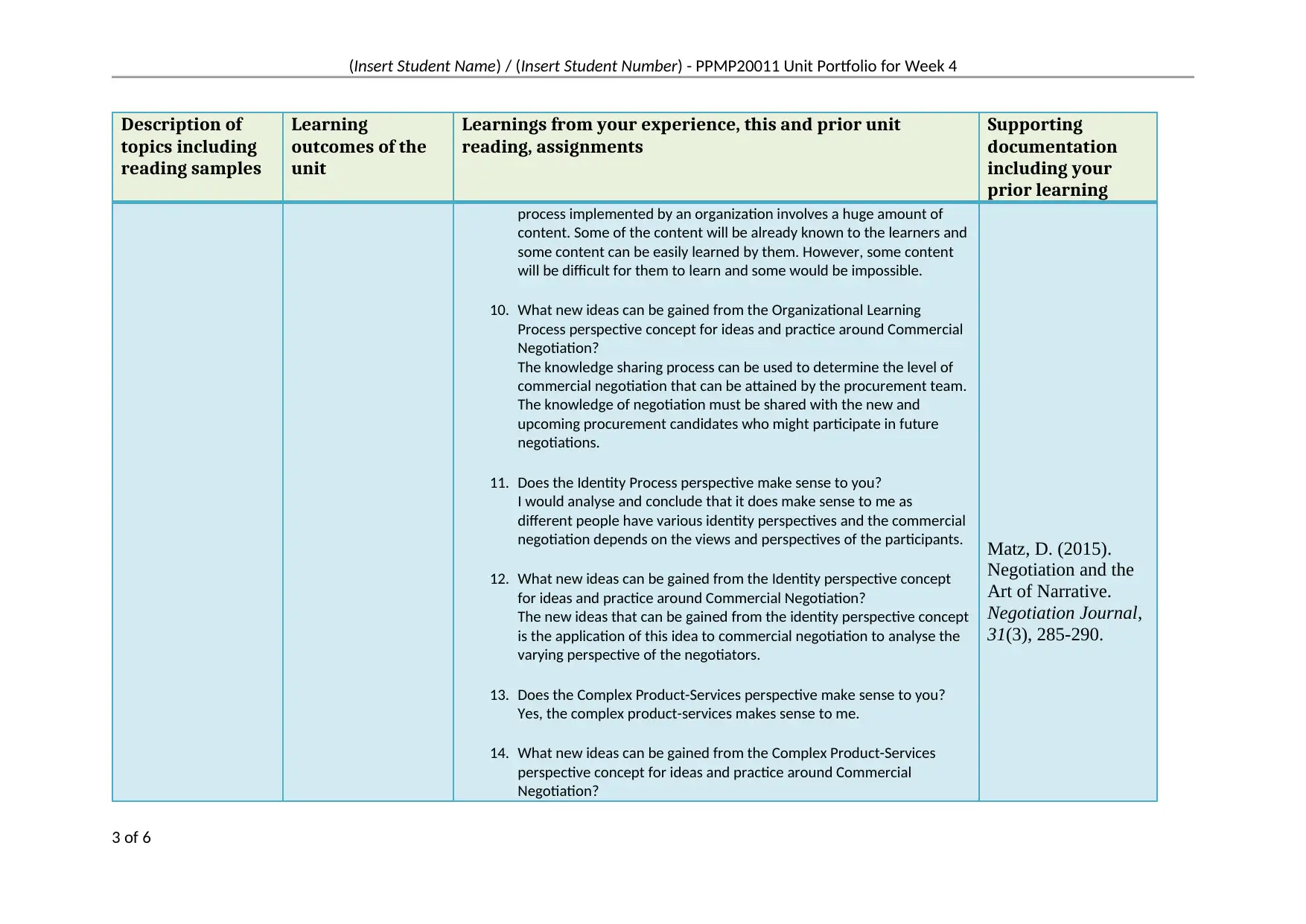
(Insert Student Name) / (Insert Student Number) - PPMP20011 Unit Portfolio for Week 4
Description of
topics including
reading samples
Learning
outcomes of the
unit
Learnings from your experience, this and prior unit
reading, assignments
Supporting
documentation
including your
prior learning
process implemented by an organization involves a huge amount of
content. Some of the content will be already known to the learners and
some content can be easily learned by them. However, some content
will be difficult for them to learn and some would be impossible.
10. What new ideas can be gained from the Organizational Learning
Process perspective concept for ideas and practice around Commercial
Negotiation?
The knowledge sharing process can be used to determine the level of
commercial negotiation that can be attained by the procurement team.
The knowledge of negotiation must be shared with the new and
upcoming procurement candidates who might participate in future
negotiations.
11. Does the Identity Process perspective make sense to you?
I would analyse and conclude that it does make sense to me as
different people have various identity perspectives and the commercial
negotiation depends on the views and perspectives of the participants.
12. What new ideas can be gained from the Identity perspective concept
for ideas and practice around Commercial Negotiation?
The new ideas that can be gained from the identity perspective concept
is the application of this idea to commercial negotiation to analyse the
varying perspective of the negotiators.
13. Does the Complex Product-Services perspective make sense to you?
Yes, the complex product-services makes sense to me.
14. What new ideas can be gained from the Complex Product-Services
perspective concept for ideas and practice around Commercial
Negotiation?
Matz, D. (2015).
Negotiation and the
Art of Narrative.
Negotiation Journal,
31(3), 285-290.
3 of 6
Description of
topics including
reading samples
Learning
outcomes of the
unit
Learnings from your experience, this and prior unit
reading, assignments
Supporting
documentation
including your
prior learning
process implemented by an organization involves a huge amount of
content. Some of the content will be already known to the learners and
some content can be easily learned by them. However, some content
will be difficult for them to learn and some would be impossible.
10. What new ideas can be gained from the Organizational Learning
Process perspective concept for ideas and practice around Commercial
Negotiation?
The knowledge sharing process can be used to determine the level of
commercial negotiation that can be attained by the procurement team.
The knowledge of negotiation must be shared with the new and
upcoming procurement candidates who might participate in future
negotiations.
11. Does the Identity Process perspective make sense to you?
I would analyse and conclude that it does make sense to me as
different people have various identity perspectives and the commercial
negotiation depends on the views and perspectives of the participants.
12. What new ideas can be gained from the Identity perspective concept
for ideas and practice around Commercial Negotiation?
The new ideas that can be gained from the identity perspective concept
is the application of this idea to commercial negotiation to analyse the
varying perspective of the negotiators.
13. Does the Complex Product-Services perspective make sense to you?
Yes, the complex product-services makes sense to me.
14. What new ideas can be gained from the Complex Product-Services
perspective concept for ideas and practice around Commercial
Negotiation?
Matz, D. (2015).
Negotiation and the
Art of Narrative.
Negotiation Journal,
31(3), 285-290.
3 of 6
⊘ This is a preview!⊘
Do you want full access?
Subscribe today to unlock all pages.

Trusted by 1+ million students worldwide
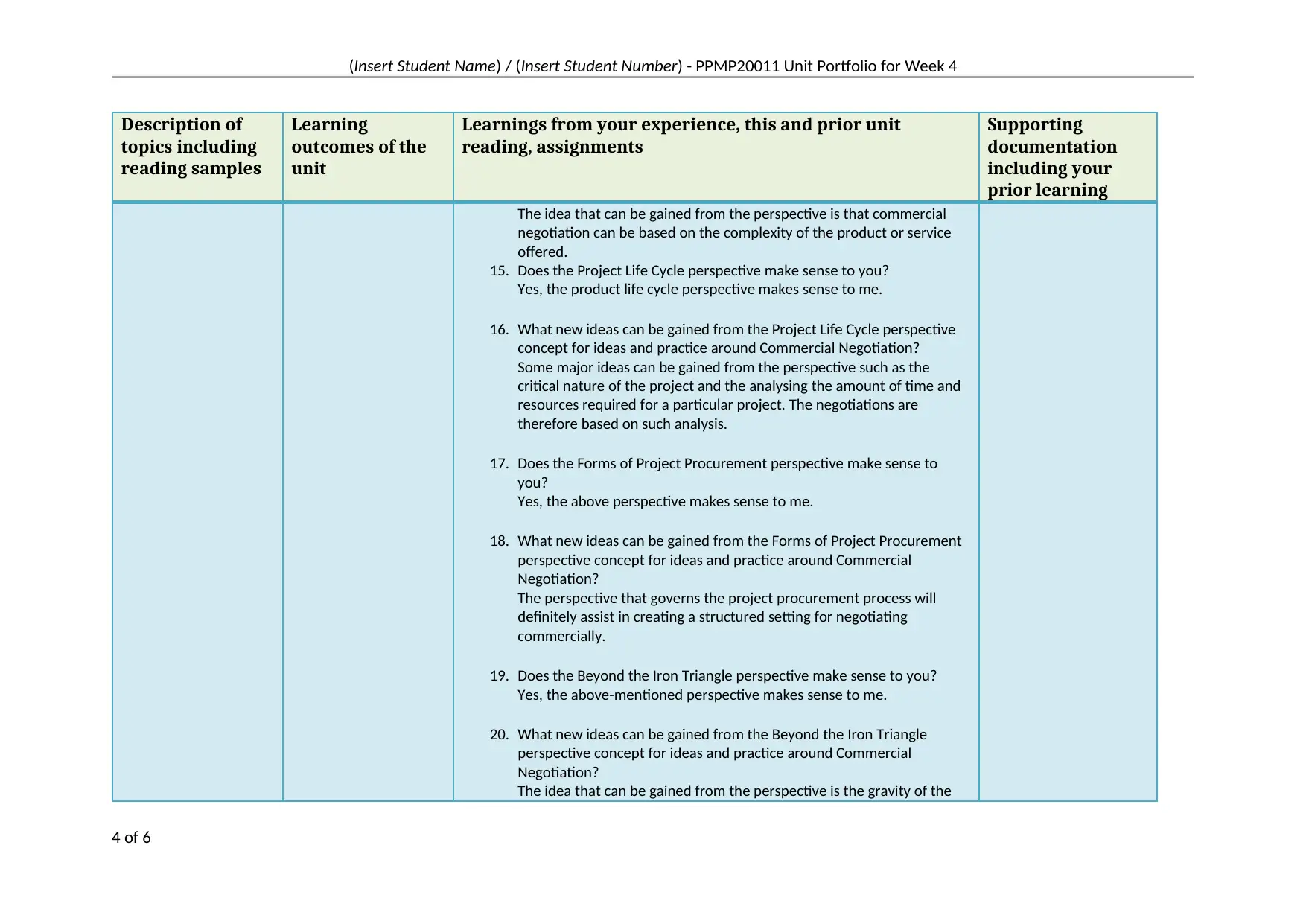
(Insert Student Name) / (Insert Student Number) - PPMP20011 Unit Portfolio for Week 4
Description of
topics including
reading samples
Learning
outcomes of the
unit
Learnings from your experience, this and prior unit
reading, assignments
Supporting
documentation
including your
prior learning
The idea that can be gained from the perspective is that commercial
negotiation can be based on the complexity of the product or service
offered.
15. Does the Project Life Cycle perspective make sense to you?
Yes, the product life cycle perspective makes sense to me.
16. What new ideas can be gained from the Project Life Cycle perspective
concept for ideas and practice around Commercial Negotiation?
Some major ideas can be gained from the perspective such as the
critical nature of the project and the analysing the amount of time and
resources required for a particular project. The negotiations are
therefore based on such analysis.
17. Does the Forms of Project Procurement perspective make sense to
you?
Yes, the above perspective makes sense to me.
18. What new ideas can be gained from the Forms of Project Procurement
perspective concept for ideas and practice around Commercial
Negotiation?
The perspective that governs the project procurement process will
definitely assist in creating a structured setting for negotiating
commercially.
19. Does the Beyond the Iron Triangle perspective make sense to you?
Yes, the above-mentioned perspective makes sense to me.
20. What new ideas can be gained from the Beyond the Iron Triangle
perspective concept for ideas and practice around Commercial
Negotiation?
The idea that can be gained from the perspective is the gravity of the
4 of 6
Description of
topics including
reading samples
Learning
outcomes of the
unit
Learnings from your experience, this and prior unit
reading, assignments
Supporting
documentation
including your
prior learning
The idea that can be gained from the perspective is that commercial
negotiation can be based on the complexity of the product or service
offered.
15. Does the Project Life Cycle perspective make sense to you?
Yes, the product life cycle perspective makes sense to me.
16. What new ideas can be gained from the Project Life Cycle perspective
concept for ideas and practice around Commercial Negotiation?
Some major ideas can be gained from the perspective such as the
critical nature of the project and the analysing the amount of time and
resources required for a particular project. The negotiations are
therefore based on such analysis.
17. Does the Forms of Project Procurement perspective make sense to
you?
Yes, the above perspective makes sense to me.
18. What new ideas can be gained from the Forms of Project Procurement
perspective concept for ideas and practice around Commercial
Negotiation?
The perspective that governs the project procurement process will
definitely assist in creating a structured setting for negotiating
commercially.
19. Does the Beyond the Iron Triangle perspective make sense to you?
Yes, the above-mentioned perspective makes sense to me.
20. What new ideas can be gained from the Beyond the Iron Triangle
perspective concept for ideas and practice around Commercial
Negotiation?
The idea that can be gained from the perspective is the gravity of the
4 of 6
Paraphrase This Document
Need a fresh take? Get an instant paraphrase of this document with our AI Paraphraser
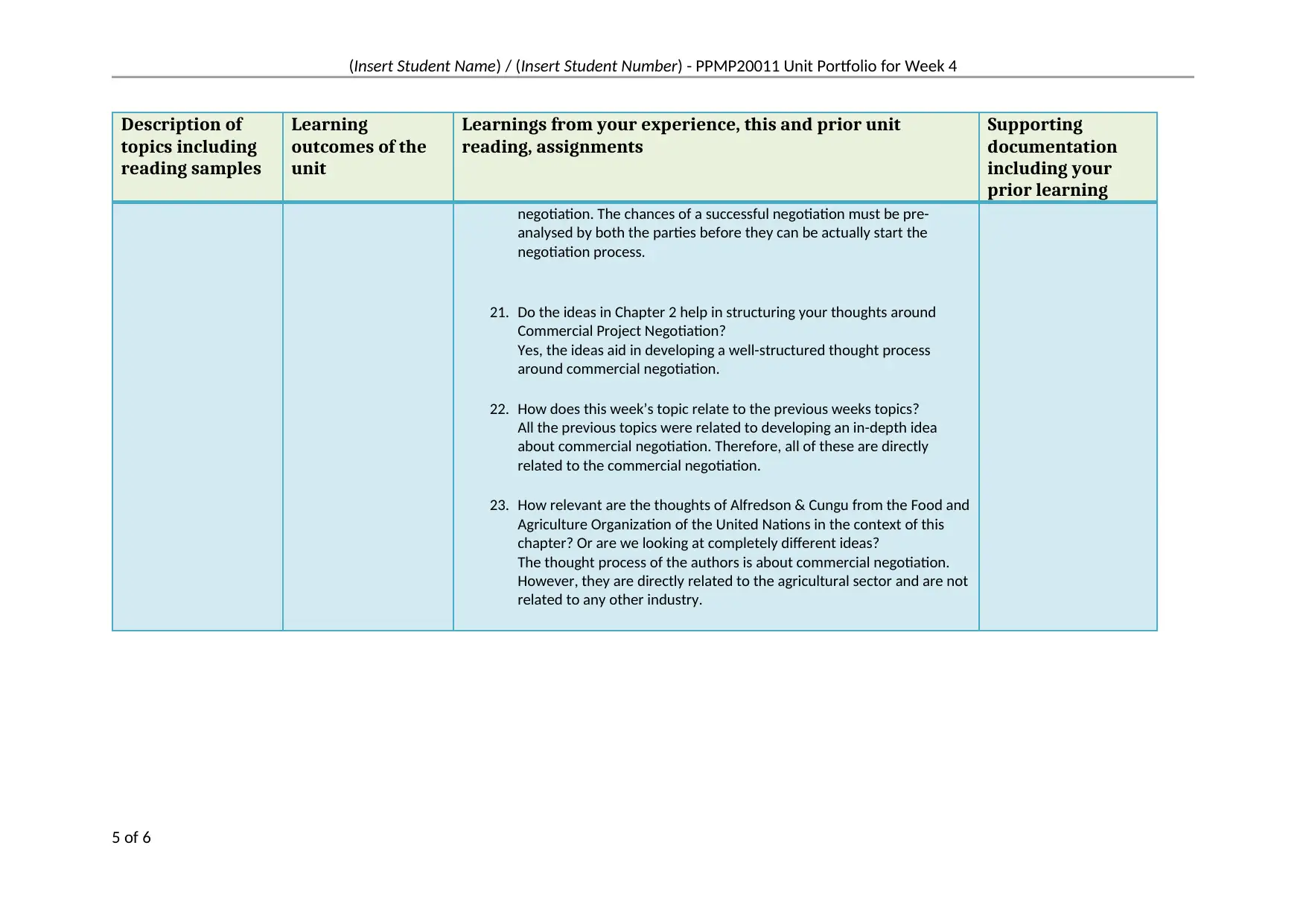
(Insert Student Name) / (Insert Student Number) - PPMP20011 Unit Portfolio for Week 4
Description of
topics including
reading samples
Learning
outcomes of the
unit
Learnings from your experience, this and prior unit
reading, assignments
Supporting
documentation
including your
prior learning
negotiation. The chances of a successful negotiation must be pre-
analysed by both the parties before they can be actually start the
negotiation process.
21. Do the ideas in Chapter 2 help in structuring your thoughts around
Commercial Project Negotiation?
Yes, the ideas aid in developing a well-structured thought process
around commercial negotiation.
22. How does this week’s topic relate to the previous weeks topics?
All the previous topics were related to developing an in-depth idea
about commercial negotiation. Therefore, all of these are directly
related to the commercial negotiation.
23. How relevant are the thoughts of Alfredson & Cungu from the Food and
Agriculture Organization of the United Nations in the context of this
chapter? Or are we looking at completely different ideas?
The thought process of the authors is about commercial negotiation.
However, they are directly related to the agricultural sector and are not
related to any other industry.
5 of 6
Description of
topics including
reading samples
Learning
outcomes of the
unit
Learnings from your experience, this and prior unit
reading, assignments
Supporting
documentation
including your
prior learning
negotiation. The chances of a successful negotiation must be pre-
analysed by both the parties before they can be actually start the
negotiation process.
21. Do the ideas in Chapter 2 help in structuring your thoughts around
Commercial Project Negotiation?
Yes, the ideas aid in developing a well-structured thought process
around commercial negotiation.
22. How does this week’s topic relate to the previous weeks topics?
All the previous topics were related to developing an in-depth idea
about commercial negotiation. Therefore, all of these are directly
related to the commercial negotiation.
23. How relevant are the thoughts of Alfredson & Cungu from the Food and
Agriculture Organization of the United Nations in the context of this
chapter? Or are we looking at completely different ideas?
The thought process of the authors is about commercial negotiation.
However, they are directly related to the agricultural sector and are not
related to any other industry.
5 of 6
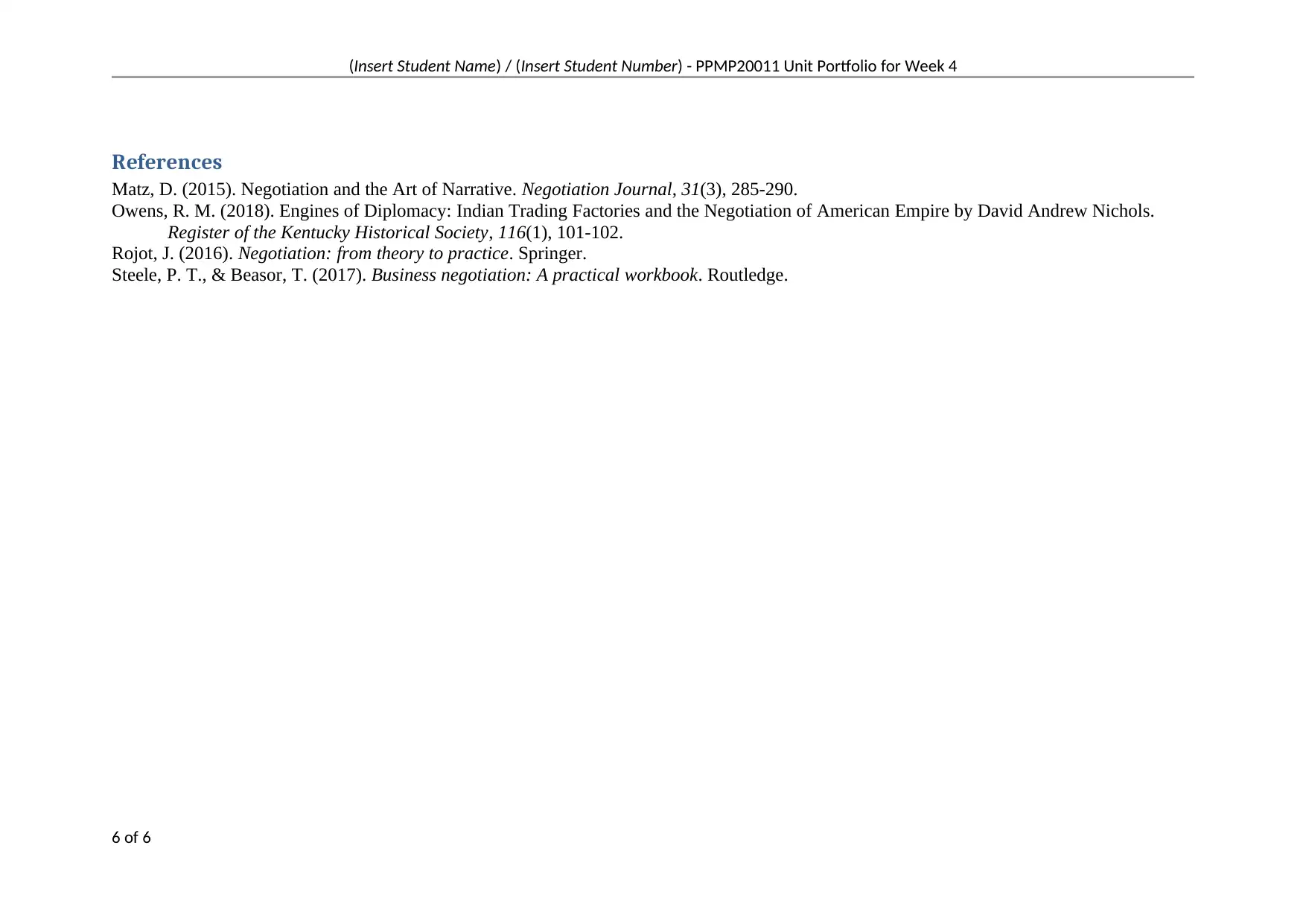
(Insert Student Name) / (Insert Student Number) - PPMP20011 Unit Portfolio for Week 4
References
Matz, D. (2015). Negotiation and the Art of Narrative. Negotiation Journal, 31(3), 285-290.
Owens, R. M. (2018). Engines of Diplomacy: Indian Trading Factories and the Negotiation of American Empire by David Andrew Nichols.
Register of the Kentucky Historical Society, 116(1), 101-102.
Rojot, J. (2016). Negotiation: from theory to practice. Springer.
Steele, P. T., & Beasor, T. (2017). Business negotiation: A practical workbook. Routledge.
6 of 6
References
Matz, D. (2015). Negotiation and the Art of Narrative. Negotiation Journal, 31(3), 285-290.
Owens, R. M. (2018). Engines of Diplomacy: Indian Trading Factories and the Negotiation of American Empire by David Andrew Nichols.
Register of the Kentucky Historical Society, 116(1), 101-102.
Rojot, J. (2016). Negotiation: from theory to practice. Springer.
Steele, P. T., & Beasor, T. (2017). Business negotiation: A practical workbook. Routledge.
6 of 6
⊘ This is a preview!⊘
Do you want full access?
Subscribe today to unlock all pages.

Trusted by 1+ million students worldwide
1 out of 6
Related Documents
Your All-in-One AI-Powered Toolkit for Academic Success.
+13062052269
info@desklib.com
Available 24*7 on WhatsApp / Email
![[object Object]](/_next/static/media/star-bottom.7253800d.svg)
Unlock your academic potential
Copyright © 2020–2026 A2Z Services. All Rights Reserved. Developed and managed by ZUCOL.




